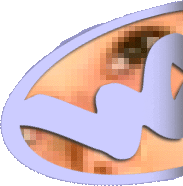|
|
|
|
|
|
|
|||
|
|
|||
|
|
|
||
|
|
|||
|
|
|
|||||||||||||||||||
 |
|
by Adam Prosser Once, in grade 5, our class was taking a test related to colour. One of my classmates was rather surprised to find that he couldn't distinguish the colour red from green. We were all surprised. It turned out he was red/green colour blind, and hadn't even been aware of it until that day. Most colour blind people must go through an experience like that at some point in their lives - since they can function perfectly well in society, no one else notices their disability; since they have nothing to compare their experiences to, they don't either. What if you were disabled and didn't know it? As a gentleman named Siddhartha Gautama* pointed out, reality is ridiculously fragile. This is because our perception of the world is based, not just on an image made up of the reflection of light particles from our immediate environment, but on our brains' interpretation of those light particles. More than any of our senses, we use the input of our eyes. We take the rays of light to recognize shape and colour, and with this information we build a little toy world upstairs in our brain-attics. A little virtual space that lets us navigate our way through... whatever's really out there. Which is a long-winded way of saying that what we see has a lot more to do with the way our brains work than we usually admit. But there's more. Stuff we can't see, because we don't need it. Light's our most important clue, I guess because there's a lot of it. But as far as the Universe is concerned, light isn't any "better" than gamma rays or ultraviolet radiation. All that stuff is there; we just don't count it. So can we really say we "perceive" the world? Fun Fact: a rhino's nasal passages are bigger than its' brain. Dogs rely far more on audio input than on their sight. Then there are the cave lizards. Do you think these creatures think about things the same way we do? Even barring the question of sentience, aren't their sensory perceptions themselves - which are the root of all communication and learning - fundamentally different? There are other ways than our own to see the world. Or, as a rhino would put it, there are other ways to smell the world. See what I mean? Or perhaps you taste what I mean. Back to my colour-blind friend. He didn't know something was wrong until he compared his experiences to others. However, he revealed nothing of his "disability" in day-to-day life. It took a specific test to make him realize something was wrong. And - here's the kicker - it only made him realize something was wrong in relation to others. Another interesting incident: as part of an experiment, a man had his eyeballs surgically altered so that he saw everything upside down. Within a mere three days, he was able to walk up and down stairs, throw baseballs at a target, and suchlike. His eyes saw things invertedly, but his mind was able to process the new information perfectly. What if he had been born that way? Who would have known that he was different? Would he have been able to convey what he saw in words? Are your eyeballs upside down? No? Are you sure? What if everyone's eyeballs were upside down? Would it fundamentally change human nature? Think about it for a second. You'd be receiving the exact same sensory input, but upside down. The input could still be used to create that little toy world of yours. And that's all we really ever see. We've seen from our test subject that people could adapt to this, in terms of physical co-ordination. So if you were born that way... how would you know? How do you know everyone's eyeballs aren't upside down? Does it matter? Maybe... just maybe... our little ideas of "up" and "down" aren't quite as meaningful as we thought. Maybe that's true of colour, too. Maybe what you see has nothing to do with what your neighbour sees. You could ask him... unless, of course, you've been speaking a gibberish language all your life and translating other people's nonsensical words into meaning through the power of your imagination. Well, that's a whole other essay. Smell ya later. *Alias the Buddha. |
|
|||||||||||||||||
|
||||||||||||||||||||
|
|